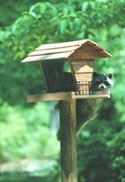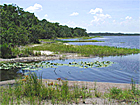Wildlife-Human Conflict
Since the 1950s, Florida has exponentially grown. Flourishing development and intensive agricultural practices has caused reduction and fragmentation of our habitats. Pollution, exploitation, and the introduction of non-native species has caused habitat loss and wildlife population declines. Despite the bleak outlook, several species have recovered through careful protection and management, including the American Alligator and the Brown Pelican (PDF).
As homes are built and land is developed on lands that were formerly wildlife habitat, animal populations increasingly come into contact with humans. This can sometimes lead to conflict. Harmony's Residential Restrictions, Guidelines and Goals prohibits feeding wildlife; backyard birdfeeders are an exception. Similarly, cats and dogs are prohibited from being off-leash off your property. Highlighted below are a few strategies to help minimize the wildlife-human conflict:
Nuisance Wildlife
When animals come into your yard or home, they have simply found an element they need for survival (food, water, shelter, or space). These animals can root through your garbage, dig up gardens, or even take up residence indoors. By identifying what is drawing unwanted wildlife to your yard, it is easier to come up with a plan that solves the problem.
Prevention is the first step! Take a few precautionary measures to prevent unwelcome wildlife:

- Keep garbage in a garbage can with a racoon-proof lid.
- Do not leave pet food outdoors.
- Consider fencing garden areas if repeated digging occurs.
- Install screens over window, doors, and chimney flues to prevent entry.
- Caulk any openings or crevices that animals may crawl through.
- If problems persist, try using the least toxic and most humane control methods first. Wildlife Damage Management is an integrated pest management program developed by the University of Nebraska Extension office that helps to identify problems and offers a range of solutions.
Also check out the Humane Society's Find Humane Solutions to Conflicts with Your Wild Neighbors.
Keep cats indoors
Free-ranging and feral cats can have a negative impact on the wildlife you attract to your backyard habitat. Cats prey on birds, reptiles, and small mammals and may also transmit disease to wild animals. The best way to protect your cat as well as our native wildlife is to keep your cat indoors.
To learn more about the benefits of keeping cats indoors, check out the American Bird Conservancy’s Cats Indoors! campaign.
For more information, check out the Florida Fish and Wildlife Conservation Commission’s Review of Feral and Free-Ranging Cats Policy.
Living with alligators
Alligators are an important part of Florida’s ecology and heritage. Their abundant populations increases the chance of human-alligator interactions and conflicts. Remember that feeding alligators is against state law and if you do come across one, do not disturb it. It will eventually retreat away from you.
People and alligators can coexist peacefully. Check out the Florida Fish and Wildlife Conservation Commission’s Guide to Living with Alligators (PDF).
If you need to report a nuisance alligator, call 1-800-FWC-GATOR.
What to do with orphaned or injured wildlife
While most injured or orphaned wildlife are picked up by well-meaning people, it is important to realize that such human-animal interactions are sometimes unnecessary. Before deciding to intervene, the most important thing to do it patiently observe the animal in its’ surroundings and decide if it actually needs help. Many animals may appear to be orphaned but actually are not. Wild babies are not constantly watched by their parents and spend lots of time alone, with the parent(s) nearby.
If you do come across an orphaned or injured animal, proceed with caution. Remember that the animal may be in pain or shock and they can bite. If you do find yourself temporarily caring for the animal, keep it in a warm, dark, and quiet container for transport to a local licensed rehabilitator. Do not attempt to care for or raise the animal yourself. It is illegal to possess wildlife without the proper state permits

